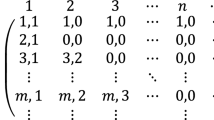Abstract
The quantal response equilibrium (QRE) is a powerful alternative to full rationality equilibrium concepts. At a QRE, all joint moves have non-zero probability. However in “mixed scenarios”, where some players use quantal response and some use best response, equilibrium strategy profiles can have joint moves with zero probability. This raises the question of applying the trembling hand refinement to such mixed scenarios. To address this I first show how to reformulate the QRE as a “best response” equilibrium where expected utilities are replaced by more general objective functions. I then show that under this reformulation the two popular types of trembling hand perfection can differ when some players use quantal response and some use best response. I end by showing that one of those types of trembling hand perfection cannot be used to remove certain troubling kinds of equilibrium in such mixed scenarios, while the other type can. The conclusion is that only the one type of trembling hand perfection should be applied when we allow some players to be quantal response and some to be best response.
Similar content being viewed by others
References
Anderson SP, Goeree J, Holt CA (2001) Minimum-effect coordination games: stochastic potential and logit equilibrium. Games Econ Behav 34: 177–199
Basar T, Olsder G (1999) Dynamic noncooperative game theory, 2nd edn. Siam, Philadelphia
Dasgupta P, Maskin E (1986) The existence of equilibrium in discontinuous economic games. Rev Econ Stud 1–26
Fudenberg D, Kreps D (1993) Learning mixed equilibria. Game Econ Behav 5: 320–367
Fudenberg D, Levine DK (1993) Steady state learning and Nash equilibrium. Econometrica 61(3): 547–573
Fudenberg D, Tirole J (1991) Game Theory. MIT Press, Cambridge
Goeree JK, Holt CA (1999) Stochastic game theory: for playing games, not just doing theory. Proc Natl Acad Sci 96: 10564–10567
Goeree JK, Holt CA, Palfrey TR (2002) Quantal response equilibrium and overbidding in private-value auctions. J Econ Theory 104: 247–272
Hopkins E (2002) Two competing models of how people learn in games. Econometrica
Kim W, Lee K (2006) Nash equilibrium and minimax theorem with c-concavity. J Math Anal Appl 328: 1206–1216
Lu H (2007) On the existence of pure-strategy Nash equilibrium. Econ Lett 459–462
McKelvey RD, Palfrey TR (1995) Quantal response equilibria for normal form games. Games Econ Behav 10: 6–38
McKelvey RD, Palfrey TR (1998) Quantal response equilibria for extensive form games. Exp Econ 1: 9–41
Meginniss JR (1976) A new class of symmetric utility rules for gambles, subjective marginal probability functions, and a generalized Bayes’ rule. In: Proceedings of the American Statistical Association, Business and Economics Statistics Section, pp 471–476
Myerson RB (1991) Game theory: analysis of conflict. Harvard University Press, Cambridge
Nikaidô H, Isoda K (1955) Note on non-cooperative convex games. Pac J Math 5: 807–815
Selten R (1975) Re-examination of the perfectness concept for equilibrium points in extensive games. Int J Game Theory 4: 25–55
Shamma J, Arslan G (2004) Dynamic fictitious play, dynamic gradient play, and distributed convergence to nash equilibria. IEEE Trans Autom Control 50(3): 312–327
van Damme E (2002) Games with imperfectly observable commitment. Games Econ Behav 21: 282–308
Wolpert DH (2007) Predicting the outcome of a game. See arXiv.org/abs/nlin.AO/0512015 for an early version (submitted)
Author information
Authors and Affiliations
Corresponding author
Rights and permissions
About this article
Cite this article
Wolpert, D.H. Trembling hand perfection for mixed quantal/best response equilibria. Int J Game Theory 38, 539–551 (2009). https://doi.org/10.1007/s00182-009-0169-2
Accepted:
Published:
Issue Date:
DOI: https://doi.org/10.1007/s00182-009-0169-2




